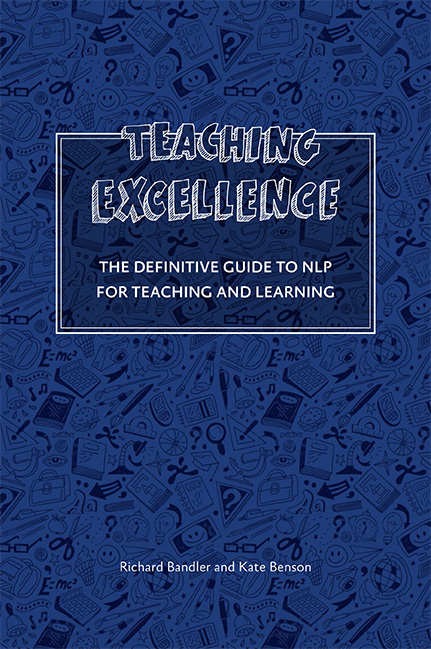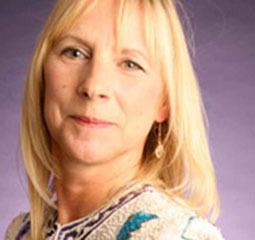Samen met Richard Bandler heeft Kate Benson het Teaching Excellence boek geschreven. Zelf ben ik er erg trots op dat wij op de achtergrond hebben mee kunnen werken om dit boek werkelijkheid te laten worden. Zo heeft mijn goede vriend Frank Zuithof die ook Joost is Blij en Joost word Gepest heeft gemaakt, alle illustraties voor Teaching Excellence gemaakt. Om die reden is het nu ook mogelijk om een sneak preview van het boek te geven. Dat is dan weer het grote voordeel van het Nederlands en Nederland: het is de ideale omgeving om zaken te testen omdat het voor de rest van de wereld zo onvindbaar en onleesbaar is.
Het Teaching Excellence boek is af en wordt half december uitgeleverd. De enige vraag waar we nog mee zitten, is: hoeveel boeken te drukken? En daar komt deze sneak preview goed van pas. Want dan kunnen we speciaal voor de mensen van The Institute of Unconventional Wisdom een voorinschrijving organiseren. De prijs van het Teaching Excellence boek (het is een dik boek (bijna 400 pagina’s – zie inhoudsopgave onderaan deze pagina) en het boek is uitgevoerd in een erg luxe, eerste editie, hardcover uitvoering) is 47,50 euro.
Het boek bestrijkt alle elementen van Kate haar Teaching Excellence. Dat betekent zowel de NLP technieken voor in de klas, maar ook de NLP technieken voor het oplossen van allerlei leerproblemen bij kinderen. Verder staan er veel case-studies in het boek. Als sneak preview heb ik zelfs het voorwoord gekregen dat je hier vindt:Voorwoord van het Teaching Excellence boek
Omdat het om een buitenlands boek gaat, valt dit boek niet onder de wet op de vaste boekenprijs waardoor ik een speciale aanbieding heb voor iedereen die zich van te voren op dit boek inschrijft. De prijs van het Teaching Excellence boek is dan namelijk geen 47,50, maar 40,- euro inc. 6% BTW. En het boek wordt binnen Nederland gratis verstuurd. De verwachte levertijd is 15 december 2016. Dus wanneer je als een van de allereerste wereldwijd dit geweldige nieuwe boek van Richard Bandler en Kate Benson wil hebben, schrijf je dan vandaag nog in voor deze prachtige aanbieding via het bestelformulier hieronder:
Hieronder staat de gehele inhoudsopgave van het boek:
- Table of contents Acknowledgements
- Preface: A revolutionary new educational technology
- Introduction
- The Challenge of Education Today
- The Solution to Successful Teaching
- The Educational Model of NLP
- How the Brain Learns
- How to be a highly effective teacher
- How to use this book
- The building blocks of NLP applied to learning
- Chapter 1 How Learning works
- Discover the fundamentals of NLP which underpin learning strategies.
- Learn the basics of NLP used in teaching
- Explore the tools for Thinking on Purpose
- Learning on Purpose – the secrets of how learning works
- Chapter 2 Building Strategies
- How to drive learning with good feelings
- A step-by-step guide to Learning Strategies
- The secrets of building motivation and propulsion for learning
- The benefits of Assessment FOR not OF Learning
- Strategies for Learning
- Chapter 3 How to teach anyone to spell
- Learn the secrets of how to spell well
- Discover the steps to teaching spelling from scratch
- Identify the steps to improve poor spelling
- Make spelling great for the whole class
- Chapter 4 How to teach anyone to read better – the mechanics and beyond
- Discover how to create pleasure in reading
- Identify the strategies to master the mechanics of reading
- Explore the difference between learning to read and reading to learn
- Learn the strategies for reading for meaning and reading quickly
- Chapter 5 How to teach anyone to remember
- Memory Strategies
- How to build a great memory
- Remembering names
- Remembering lists and facts
- Making remembering fun and rewarding
- Chapter 6 How to teach anyone to calculate
- Strategies for Mathematics
- Developing your ‘Mathematical Mind’
- Counting and Skip Counting
- Attractive Addition
- Sublime Subtraction
- Chapter 7 Mathematical Magic
- Mastering Multiplication
- Fast and effective Division
- Geometry made easy
- Engineering successful strategies
- Chapter 8 How to nurture creativity and talent
- Strategies for Music Strategies for Art
- Strategies for Creative Writing
- How to become a Highly Effective Classroom Teacher
- Chapter 9 What makes a Highly Effective Teacher?
- Discover the core beliefs that highly effective teachers hold true
- Translate these beliefs into effective behaviours in the classroom
- Develop the 7 habits of highly effective teachers
- The Mind of a Highly Effective Teacher
- Chapter 10 The Art of the State
- Choose success ahead of time
- Be ready for any challenge
- Control the variables in the class
- Drive your own neurology
- Optimise your pleasure in teaching
- Chapter 11 Winning your Class over
- Discover the secret of super-fast rapport
- Create powerful learning states with your students
- Control the variables in the classroom
- Learn how to anchor great learning states
- Chain states together to lead students into resourceful learning states
- Chapter 12 Building an effective learning environment
- The success focus attitude
- The keys to engagement and motivation in the classroom
- Building exciting learning outcomes
- Removing barriers to success
- Chapter 13 Keeping the Lesson on Track
- Spinning the prayer wheel
- Building Confidence with Competence
- How to praise effectively
- Giving feedback for great results
- Chapter 14 Ending with New Beginnings
- Creating the desire for more learning
- Taking the learning beyond the classroom
- Stretch and Challenge through questioning
- Storytelling and Nesting learning
- Troubleshooting and Challenges
- Chapter 15 Challenging unhelpful beliefs and attitudes
- Learn how to shrink a BIG problem down to size
- Discover what is really being said
- Use effective questions for change
- Changing beliefs and attitudes about learning
- Chapter 16 Timelines and other techniques for success
- Timelines in the classroom – preparing for exams
- Bringing success into the present
- Spinning bad feelings into good feelings
- From stuck to motivated with a Visual Squash
- Swish for a change Visual Squash for a whole class
- Chapter 17 Strategies for Learning Difference
- Learning difference not difficulty
- Working with ADHD, Dyspraxia, Dyslexia, Autism and OCD
- How to teach to the symptom not the syndrome
- Explore neurological diversity
- Fun in school
- Chapter 18 Early years: Under 5-years-old
- Changing submodalities to overcome anxiety and create happy states
- Small changes in language create a big impact on an under 5
- Language patterns with children with little English language
- How to use of music for state management
- Creative use of spatial anchoring in the classroom
- Chapter 19 Primary and Elementary school: 5-to-11-year olds
- Subject specific teaching strategies
- Whole class Spelling strategy
- Spelling success in the Netherlands
- Spreading the strategy across the school
- Comfort and fun to improve reading
- Eye accessing study of different reading strategies
- Creativity and confidence in French language teaching
- Creative use of NLP for creative writing
- Chapter 20 Primary and Elementary school: 5 to 11-year-olds
- Creating positive learning states and overcoming challenges
- Milton Language patterns with a hearing impaired learner
- Creating happiness and harmony for a child with multiple challenges
- Working with a child displaying severe anxiety
- Simple language changes for big impact
- Spatial classroom anchors for quiet attention.
- Readiness to learn – metaphors and stories
- Chapter 21 Secondary and High School 11 to 15-year-olds
- Creating enthusiasm for French grammar
- Moving from a child who does not write to a writing enthusiast.
- It’s good to talk in Science teaching
- State and language to build confidence in outdoor pursuits
- Revision and recall in Science
- Voice tone and body language in Food Technology
- Chapter 22 Post-compulsory education: 16 years and over
- Preparation for success
- Memory strategy research
- States for Learning Excellence, observation and Leadership for Undergraduates
- Academic Coaching and mentoring
- Chapter 23 Making a Difference to the Educational World
- Challenging self-limiting beliefs in school
- Disseminating NLP across the whole school
- Supporting change in a school in
- Special Measures
- Conclusion
- Appendix A
- Submodality checklist
- Appendix B Questions to calibrate eye accessing cues
- Appendix C The Meta Model and Blooms Taxonomy
- Appendix D Exam preparation transcript
- Appendix E Glossary of terms
- Bibliography
- The Authors




